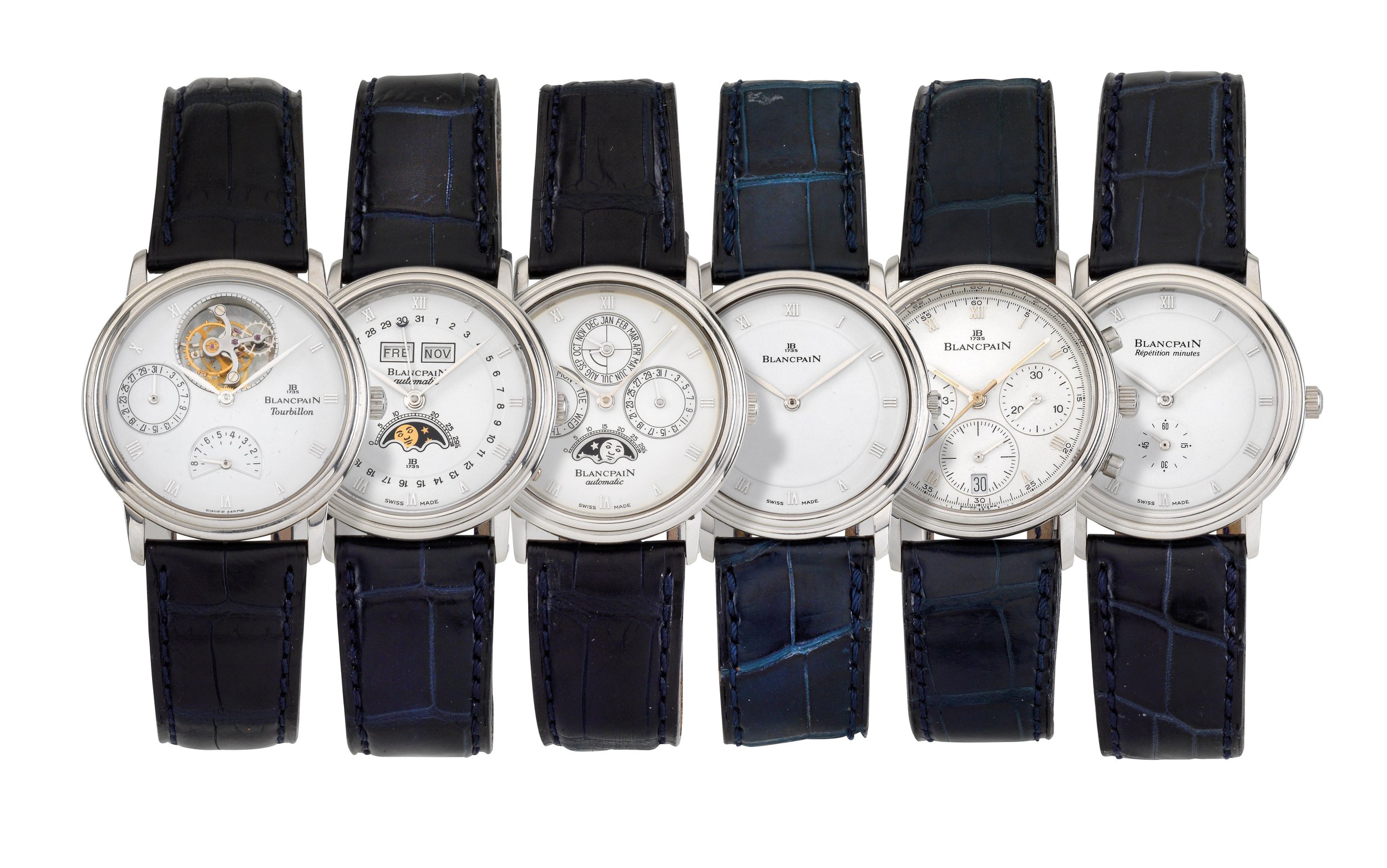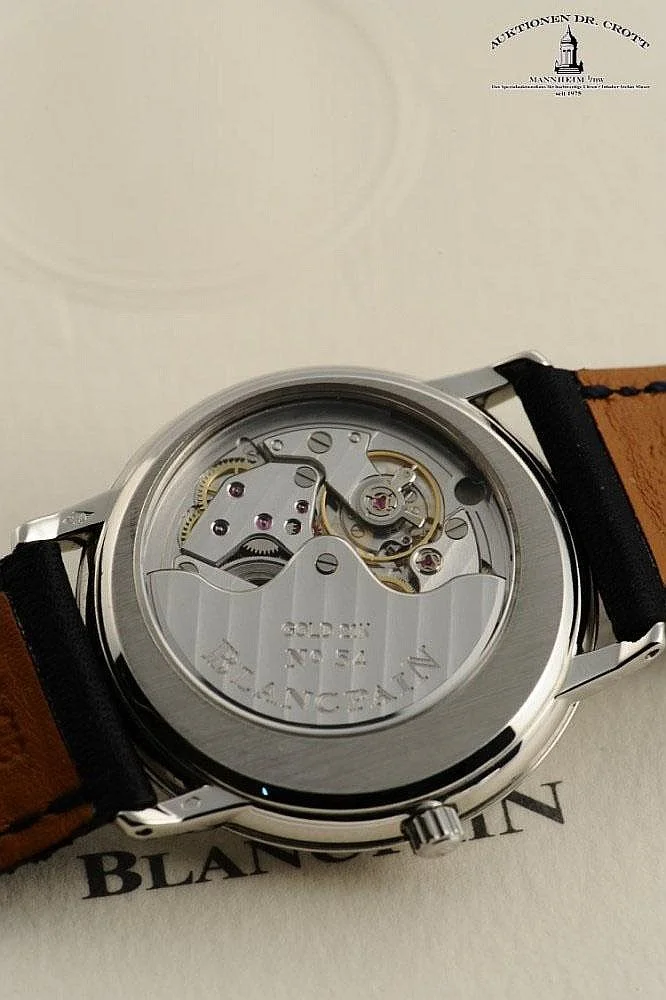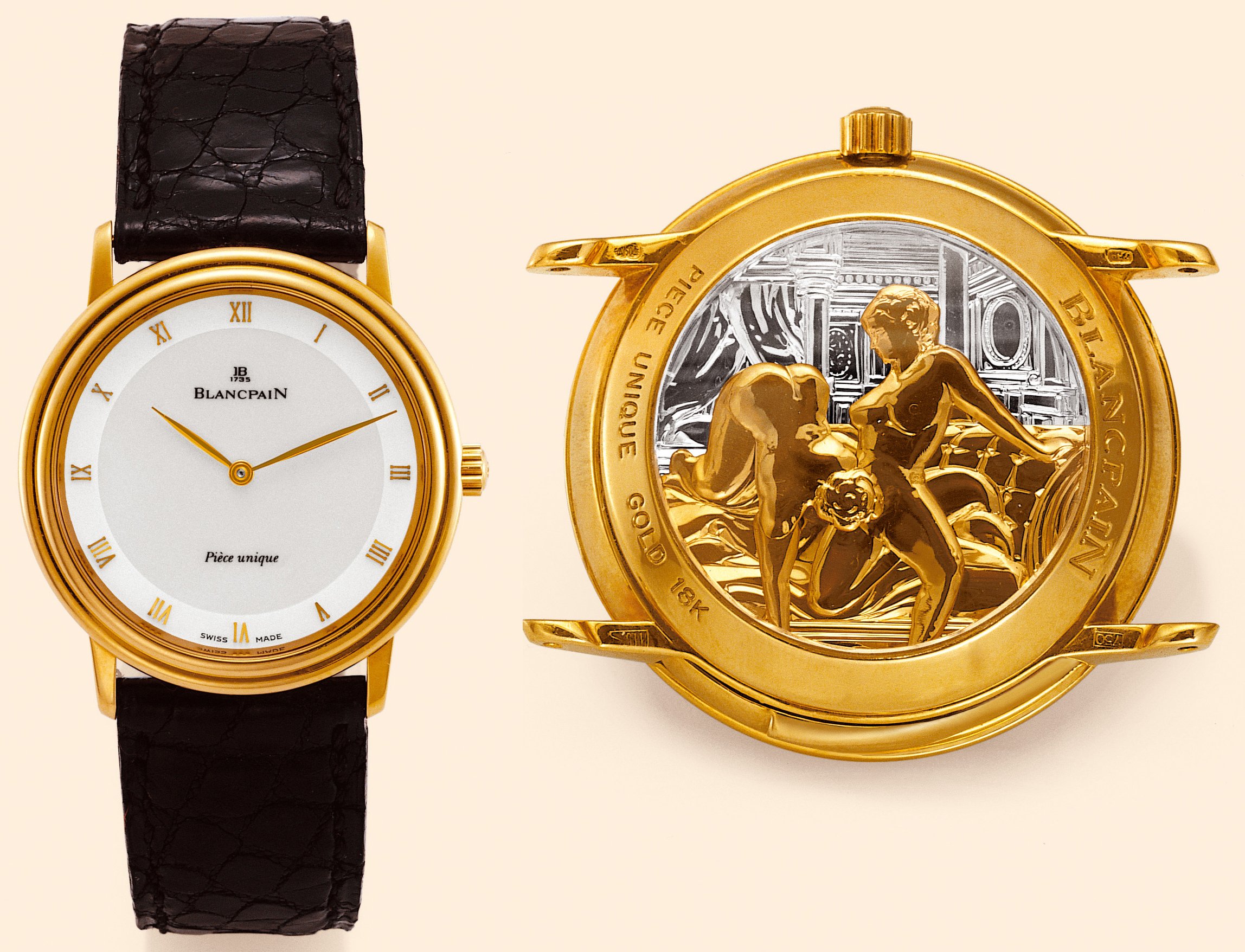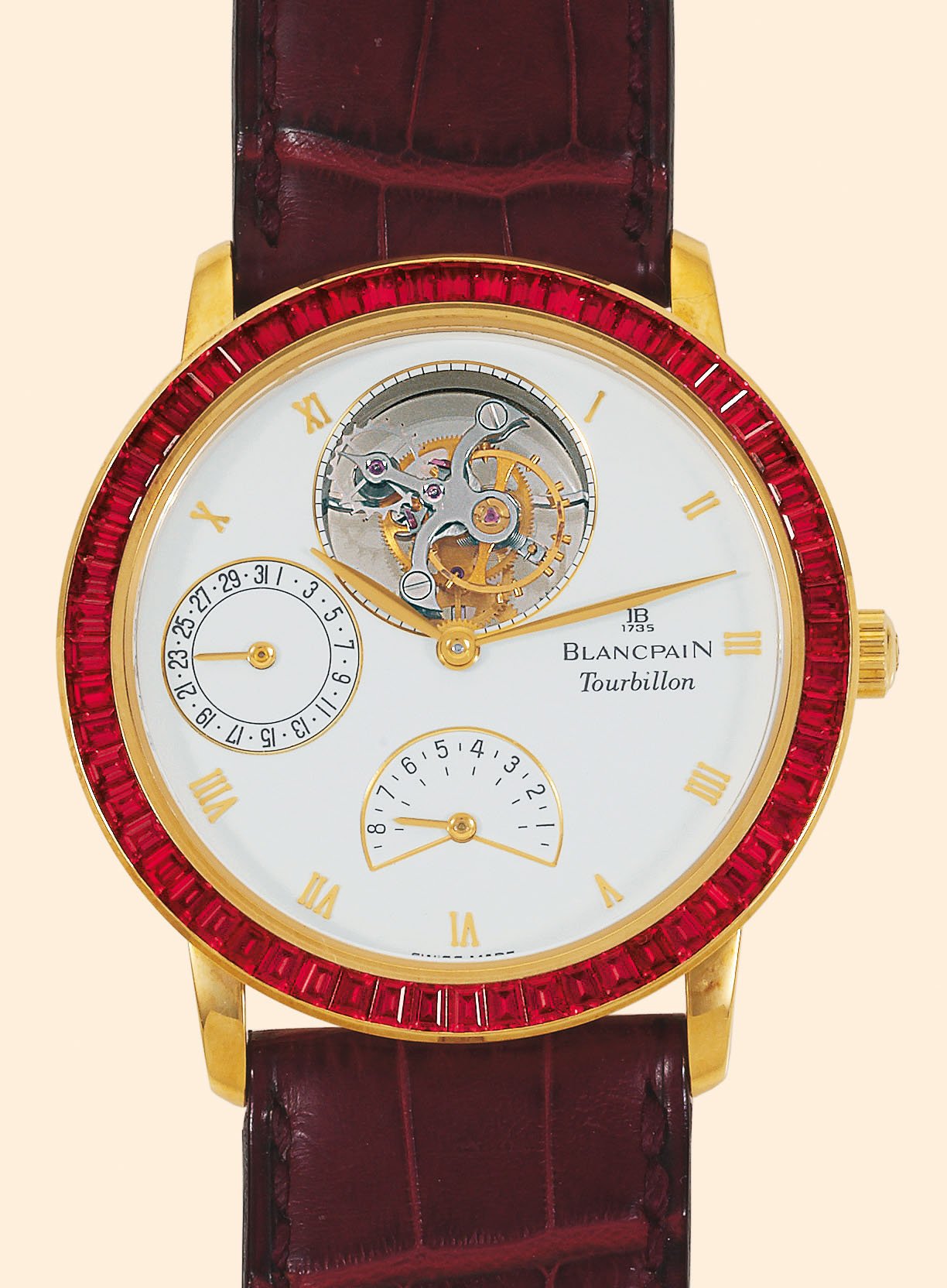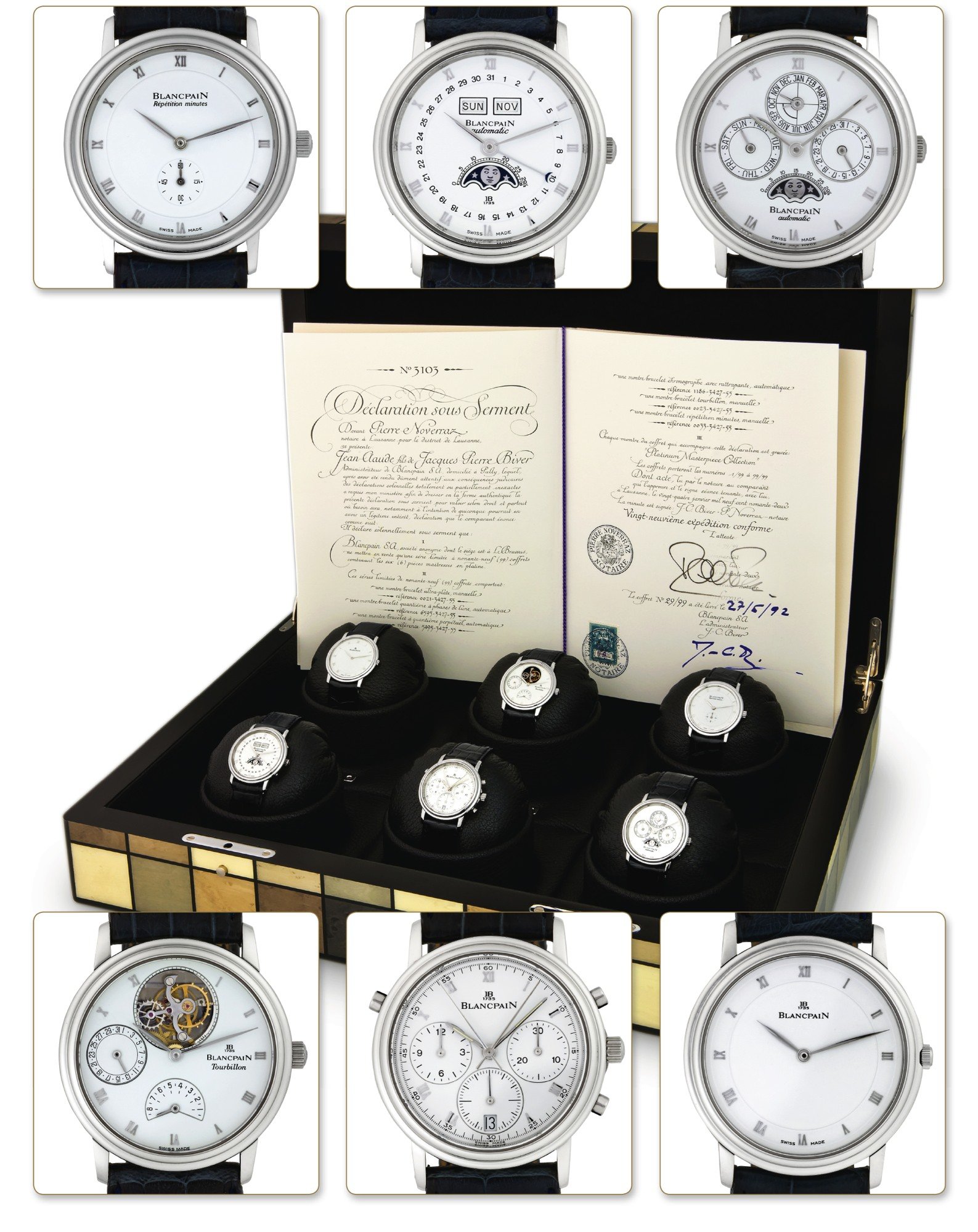Forgotten Watches — Neo-Vintage Blancpain And The Six Masterpieces
6595 Mother of Pearl, Bachmann-Scher
‘Since 1735 there has never been a quartz Blancpain and there never will be’
Blancpain Reborn
It was 1981 in the midst of the the quartz crisis that Jean-Claude Biver and Jacques Piguet decided enough was enough and set upon a mechanical mission that would change the course of horological history forever - their mission, to launch a range of high end mechanical complications, and they did so with a name that has been around since the beginning of time, Blancpain.
Purchasing the rights to Blancpain for as little as 22,000 CHF the pair spotted an opportunity to capitalise on the quartz crisis, there was an abundance of highly skilled watchmakers and a brand name rich in historical and horological importance. Their vision, a brand that represented traditional Swiss watchmaking and that only.
The pair set to work in a farmhouse in Le Brassus, the Joux Valley, on the historic farm of Louis-Elisée Piguet adjacent to the Frédéric Piguet workshop. Blancpain had previously been based in Villeret for almost 200 years since being founded by Jean-Jacques Blancpain but it was to be no more.
With Biver heading marketing and sales and Piguet leading the manufacturing they began to dream up what we now know refer to as ‘the six masterpieces’.
This article is an exploration and overview of these models and why their historical and technical importance is of interest to us and if not already, to you and the wider watch community.
6595, Christie’s
‘I didn’t want to relaunch Blancpain solely with hours and minutes watches. They had to have the traditional sobriety, beautiful finishes, but also additional features.’
— JEAN-CLAUDE BIVER for Europastar
The Six Masterpieces:
Complete Calendar Moon Phase, Ultra-Thin, Perpetual Calendar, Minute Repeater, Split Seconds Chronograph and Flying Tourbillon.
Six Masterpieces, Dorotheum
Before we jump in
Reference Codes
XXYY (Module & caliber) - XXYY (Case & dial) - XX (Strap/bracelet)
Module & caliber - XXYY - XX
The module and caliber housed within the watch dictates the inital number. For example ref. 6595 Complete Calendar Moon Phase.
65 - name of the module
95 - first 2 digits of the base calibre
Ref. 6595 actually a module 65 mounted on top of the 951 calibre
Blancpain Calibre Chart, Circa1970
Complete Calendar Moon Phase
6595 - XXYY - XX (Automatic)
Ultra-thin
0021 - XXYY - XX (Manual)
0071 - XXYY - XX (Automatic)
Perpetual Calendar
53/5495 - XXYY - XX (Automatic)
Minute repeater
0033 - XXYY - XX (Manual)
0035 - XXYY - XX (Automatic)
Chronograph
1180 - XXYY - XX (Manual)
1185 - XXYY - XX (Automatic)
1186 - XXYY - XX (Split-seconds Automatic)
Tourbillon
0023 - XXYY - XX (Manual)
XXYY - Case & Dial - XX
Middle section of the reference code with the first 2 letters being the case material with the next 2 letters the dial.
XXYY - 1127 - XX = Steel case & white dial
XXYY - 1318 - XX = Steel & 18k yellow gold case & white dial
XXYY - 1418 - XX = 18k yellow gold case & white dial
XXYY - 1518 - XX = 18k white gold case & opaline dial?
XXYY - 3318 - XX = 18k pink gold case & white/cream dial
XXYY - 3427 - XX = Platinum case & white dial
XXYY - XXYY S -XX = Skeleton
..Exotic Dials
XXYY - XX28 - XX = 9,11 or 12 diamonds (dependant on model)
XXYY - XX29 - XX = Blue dial 31 diamonds
XXYY - XX30 - XX = Black dial (limited series)
XXYY - XX31 - XX = Cloisonne enamelled dial (unique pieces)
XXYY - XX33 - XX = Cloisonne enamelled dial, outside lapis lazuli 12 diamonds (unique pieces
XXYY - XX40 - XX = Blue dial (limited series)
XXYY - XX90 - XX = mother of pearl 9,11 or 12 indexes (dependant on model)
XXYY - XX92 - XX = mother of pearl 9,11 or 12 diamonds (dependant on model)
Exotic Case..
XXYY - 22YY - XX = Yellow gold bezel set with baguette diamonds (60 D 2,60 ct)
XXYY - 38YY - XX = Yellow gold bezel set with 2 rows of brilliants (137 D 1,05 ct)
XXYY - 42YY - XX = Platinum bezel set with baguette diamonds (60 D 2,60 ct)
XXYY - XXYY - Strap/bracelet
Final part of the reference number.
XXYY - XXYY - 11 = Steel
XXYY - XXYY - 31 = Yellow gold
XXYY - XXYY - 34 = Platinum
XXYY - XXYY - 55 = Crocodile
XXYY - XXYY - 58 = Ostrich
XXYY - XXYY - 65 = Lizard
XXYY - XXYY - 78 = Satin
XXYY - XXYY - 92 = MOP bracelet
Huge thank you to @Ciaca1970, @watches_and_guinness & @watchdilettante for this technical insight & imagery.
Now for the Masterpieces overview
1st Masterpiece
Complete Calendar Moon Phase
Introduced circa 1983
Ref. 6595
The first model to be released from Blancpain was the Complete Calendar Moon Phase, featuring the Cal. 6395 (26mm case) and Cal. 6595 (34mm case). This was a special moment as Blancpain actively brought back traditional complications while the majority of the watch market shied away in favour of simple quartz movements. Not only this but the Cal. 6395/6595 reignited interest in mechanical watches and set a record as having the smallest complete calendar moon phase plate of any watch in history.
Calibre 6395 Moon Phase
This direction was exactly what the duo had set out to do, complicated high end watchmaking that quartz pieces just couldn’t replicate.
The case measured just 34mm (as do all the masterpiece models) and could be purchased in a variety of metals and bands, commonly seen sold head only the watch can be found and attached to a Gay Freres bracelet. Turning the case over you’ll find a solid case back featuring case number and appropriate hallmarks for precious metals. The most notable piece we’ve seen being a fully gem set piece unique.
The design is classic and straight out of the Piguet linage, pure watchmaking class for the world to see and enjoy!
EuropaStar 1984 Ad, Grail-watch
6595 Mother of Pearl, Bachmann-Scher
6595 closed case back, Chronometrie-Pietzner
‘In the attic at Frédéric Piguet, we found all the tools we needed, unused since the 1940s, to make a day, month, date and moon phase movement. We got to work right away and modified it so that the month changed automatically every 31’
— JEAN-CLAUDE BIVER for Europastar
Piece Unique - Factory Diamond and Sapphire set, Tom Bolt - Watch Guru
2nd Masterpiece
Ultra-thin
Introduced circa 1984
Ref. 0021 (Manual)
0021 Ultra thin, EPPLI
0021 Ultra thin, EPPLI
Balance and elegance, the clean aesthetic of the dial combined with the mechanical achievement of the movement, a true watchmaking piece of art. The Ref. 0021 was found in a host of metals, dials and bands, not forgetting of course a skeleton dial variant - shown further down.
Development on this movement spanned from circa 1911 to 1925. The resulting Cal. 21 measured less than 1.75mm in height and is still used today. Combined with the case the ultra-thin measures a total of just 5.6mm thick (or should we say thin..).
Skeleton Variants
Shown below in 18k yellow gold and platinum are skeleton variants, manually wound, produced later in production. The reference number depicts ‘Skeleton’ with the ‘S’ in the code eg. 0021-3427 S -55 (manual) or 0071-3427 S -55 (automatic).
Ref. 0071 (Automatic)
An automatic variant was also later introduced with the Cal. 71, showcasing an off-centre winding mass and display case-back. To note ‘Automatic’ does not appear on the dial unlike later iterations of the Ultra-thin.
0073 Ultra-Flat Automatic, Antiquorum
Case-back, Auktionen Dr. Crott
3rd Masterpiece
Perpetual Calendar
Introduced circa 1986
5395 steel, Christie’s
Ref. 5395
(no leap year indicator)
A few years after the Complete Calendar Moon Phase Blancpain introduced their first perpetual calendar, Ref. 5395. This model was based on the Cal. 95 with a 53 perpetual calendar module. You can see how the reference number is comprised from the module & calibre.
The watch features a triple register dial with deep-set moon phase at 6 o’clock. The design is extremely pleasing on the eye with symmetry and simplicity at its core. To note, Ref. 5395 did not have the leap year indicator on the dial.
The case measures just 9mm thick and 34 mm diameter making it a compact and wearable watch across most wrist sizes.
5395 steel and 18k yellow gold, TimePeaks
Ref. 5495
(Leap year Indicator)
5495 Mother of Pearl, @ciaca1970
An upgrade to the calibre resulted in the Cal. 5495, with the Ref. 5395 becoming the Ref. 5495. The technical and design alterations being the leap year indicator in the 12 o’clock sub-dial. Later iterations of the reference added more detail to the 12 o’clock sub-dial with the addition of numerals in the circle quarters, these have also been seen on later service dials.
Both Ref. 5395 and Ref. 5495 were available across multiple metals including platinum and gem set examples, Ref. 5495 can also be found with a display case back (see below).
5495 Biver’s very own no. 00, HODINKEE
Late 5495 with quarters 12 o’clock sub dial, Bachmann-Scher
Find below a review of the ref. 5495 by Tim Mosso @TheWatchBox
4th Masterpiece
Minute Repeater
Also introduced circa 1988
Ref. 0033 (Manual)
Circa 1988 Blancpain introduced one of the smallest minute repeaters ever made. The minute repeater is undisputedly the most outstanding achievement of traditional watchmaking, an extraordinary result of horological creativity and the mastery of acoustics.
This complication was originally developed long ago to solve the problem of telling time in the dark. In that epoch, luminous hands and numerals did not exist. - Master Horologer.
How it works in short, two hammers briefly strike two carefully tuned gongs, chiming the number of the hours, quarter hours and minutes.
‘The calibre 33 took more than 10,000 hours of work to develop and tune this minute repeater.’
- Blancpain
0035 (Automatic)
0035 Minute Repeater Automatic, Antiquorum
As seen above a winding mass was added to create the Cal. 35. The new calibre meant a change in thickness, from a mere 3.3mm for the Ref. 0033 up to 4.85mm for the Ref. 0035.
Interestingly this particular watch pictured here is in two tone, 18k yellow gold and platinum - Watch thought to be part of a set called, ‘Three Precious Metal Set’.
The minute repeater was the most expensive complication amongst the six masterpieces. The Automatic was more expensive to purchase than the Manual with only the ‘Automata’ topping it - more on this next.
Ref. 0033 — Automata
’Erotic Minute Repeater’
Unveiled in 1993 embellished with automata that animates engraved or enamelled skits. Each skit is unique, hence each watch being marked ‘Piece Unique’ on the caseback.
0033 Automata, Antiquorum
Automata, or moving figure watches have had a checkered past… Religious authorities in the Swiss cantons of Geneva and Neuchâtel formed an alliance to strike out against this free libertine exotic expression. Not only was further production of the watches banned, but those in existence were made subject to seizure. - Master Horologer
Ref. 5335 — Minute Repeater with Perpetual Calendar
Around 1 year after the introduction of the Ref. 0035 Blancpain elegantly combined it with one of their earlier complications, composing a perpetual module with the minute repeater base calibre. All of this in just a 34mm case. This reference has come to market in 18k yellow gold and Platinum.
5335 Minute Repeater Perpetual Calendar, Sotheby’s
5335 Minute Repeater Perpetual Calendar, Dorotheum
5th Masterpiece
Chronograph
Circa 1988/9
Ref. 1186 — ‘Rattrapante’ Split Seconds (Automatic)
1186 Rattrapante, Watch Brothers London
Although not the first chronograph calibre the Ref. 1186 marked the introduction of the ground breaking Rattrapante Chronograph (split-seconds) securing its position in the Six Masterpiece lineup. Super thin at just 6.75mm the calibre was based on the ultra-thin automatic F. Piguet Cal. 1185 which we’ll touch on a little later.
The ref. 1186 was the first automatic split-seconds chronograph movement ever produced.
The Cal. 1186 included the same vertical clutch column wheel as the Cal. 1185 able to constantly run without additionally running down the power reserve. All of this housed within the 6.75mm thick, 34mm diameter case. A true feat in watchmaking which went on to become a flagship model for the Villeret range.
Ref. 1186 was available in 18k yellow gold, 18k pink gold and platinum, seen on a variety of metal bands and straps. We recently had the pleasure of selling a rather beautiful Mother of Pearl dial variant, a favourite of ours for sure.
1186 movement, orologi.forumfree.it
Vintage AD, Grail Watch
Rare 1/10 baguette-cut diamond-set bezel Ref. 1186
Throughout all complications within the Six Masterpieces there are more adventurous dial/bezel/case/bracelet options, we’ve been very surprised and excited about the wonderful and rare pieces we’ve been lucky to come across.
1/10 Diamond bezel, Philips
Ref 1185 — Chronograph (Automatic)
Introduced circa 1988
1185 Tiffany, Craft and Tailored
For a long while the worlds thinnest chronograph movement, until the recent Bulgari Octo Finissimo.
In 1988 Frédéric Piguet introduced the Cal. 1185 based on the previous Cal. 1180, a hand-winding movement. The Cal. 1185 was very similar in construction, with just the automatic bridge and winding system added.
1185 Tiffany, Craft and Tailored
1185 bracelet, World of Time
In regards to the Six Masterpieces the Ref. 1185 was the predecessor to the featured split seconds chronograph above Ref. 1186 however it’s important to note the horological importance of this calibre.
Wonderful review of the Ref. 1185 by Mark Hackman, Crown & Caliber Youtube Channel below.
Cal. 1185 was also highly regarded by many high end brands and went on to be used by Audemars Piguet in the Royal Oak (renamed calibre 2385 used in the ref. 25860 for example shown below), Cartier, Chopard, Vacheron Constantin plus more and the movement remains in production and use today.
25860 with movement based off the FP 1185, Watch Club
Chronographs with Perpetual Module
5585 Perpetual Calendar Chronograph, Antiquorum
Ref. 5585 — Chronograph Perpetual Calendar
The Ref. 5585 combines the Cal. 1185 and the 55 perpetual module. The case size remains the same at 34mm with thickness slightly increased The reference was available in 18k yellow gold, 18k rose gold, steel/18k yellow gold (rare) and steel.
The dial features a similar layout to the perpetual calendar however houses the chronograph instruments in sub-dial 3 & 9 with operating pushers on the case side.
5581 Perpetual Calendar Split Seconds, Christie’s
Ref. 5581 — Split Seconds Perpetual Calendar
Ref. 5581 has its own calibre, Cal. 5581 and is manual wind. The watch features the additional split seconds compilations with a pusher at 10 on the case side.
6th and Final Masterpiece
Flying Tourbillon
Introduced circa 1989
Ref 0023
1991 EuropaStar ad
The World’s First Wristwatch Flying Tourbillon & World’s Thinnest Hand-wound Tourbillon.
Not one to follow suit Blancpain in collaboration with Vincent Calbrese introduced their own twist on the classic tourbillon, the flying design provided an unobstructed view unobstructed view of the tourbillon cage, balance wheel and escapement.
The entire tourbillon cage is supported from underneath, on a single bridge. In order to accomplish this feat, Blancpain’s watchmakers had to develop a miniscule ball bearing assembly to support the rotating tourbillon cage. - Master Horologer
A final note on the power reserve, an incredible 8 days, the worlds first 8-day power reserve tourbillon, all of this housed within a 8mm thick case.
The tourbillon was the final piece in the Six Masterpiece collection and we think it’s fair to say it delivered on all fronts.
0023 platinum, Christie’s
0023 platinum, Christie’s
Spotted on HODINKEE Talking Watches, and property of Bill Higgins is this rare ‘Military Dial’ Ref. 0023 in white metal. If you’d like to watch the full episode find it here, timestamp 11mins 36secs.
0023 Rare Military Dial belonging to Bill Higgins, HODINKEE
Early vs Late Models
There are a number of visual differences eg. early Ref. 0023 (1989-95) are found with the Blancpain logo closer to the centre of the dial vs later post 1995 models also the inner track on the date sub-dial differs.
Likely the most interesting difference however is the power reserve indicator, early models count how many days remaining and later models count how many days since full charge. 8 to 1 vs 1 to 8 on the 6 o’clock sub-dial.
Gem Set Tourbillon 0023
60 baguette-cut diamonds and rubies.
0023 Diamond Set, Antiquorum
0023 Ruby Set, Antiquorum
The result
Masterpiece Collection
By the end of 1988, Blancpain collection had the six masterpieces of Horology.
In 1991 Blancpain proudly presents all six masterpieces of watchmaking art simultaneously and in identical cases. It was possible to buy a complete set in Platinum, made in a limited edition of 99 sets of six timepieces throughout the 90’s.
Masterpiece Collection, Dorotheum
The Six Masterpiece sets were said to be curated and offered for sale to celebrate the launch of ref. 1735 grand complication. See below the unique checkerboard box and booklet the accompanied each set.
Masterpiece Collection, Antiquorum
Masterpiece Collection box, lacotedesmontres.com
Credits & Thank You
This article could not have come together without the information and help from these sources, thank you.
Watch Base — Detailed calibre and movement information
Master Horologer — History and calibre information, incredible resource, highly recommended
Grail-Watch — Wonderful insight into the history of the brand and Six Masterpieces
@Ciaca1970 — Technical information and photography

